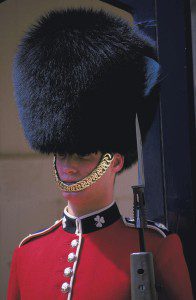The UK’s Evangelical Alliance has officially expelled one of Britain’s largest evangelical organizations for insufficient anti-gayitude: “Major Ministry Kicked Out of Evangelical Alliance UK Over Homosexuality Stance.”
That link is to a Christianity Today report, but you probably already guessed that due to the white evangelical lingo in that headline. Where else are you going to find people obsessing about the importance of a proper and acceptable “Homosexuality Stance”?
Christianity Today explicitly affirms the sanctions imposed by its UK counterpart by, in its own way, kicking that same major ministry out of the white evangelical tribe on this side of the Atlantic:
Oasis Trust, a sizable ministry founded by a prominent but controversial British Christian leader, has been “discontinued” as a member of the United Kingdom’s largest evangelical group after its board refused to adjust online resources and social media to “equally profile the traditional Christian view” on human sexuality.
Steve Chalke used to be “British evangelical leader Steve Chalke.” Not anymore. Now he’s just some guy, an outsider — a Christian, yeah, maybe, technically, but no longer our kind of Christian.
Steve Chalke is now, officially, “controversial.”

That’s a key designation for tribal gatekeepers. If you want to understand the tribe and its boundaries, keep track of how and when that designation is used.
Here, for example, is a recent Christianity Today piece on domestic-violence apologist and spanking guru James Dobson, founder of Focus on the Family. James Dobson is not “controversial.”
And here is a recent CT report on Bill Gothard — the creepy proponent of a cult-like fundie subculture promoting patriarchy and purity culture whose decades-long “ministry” finally imploded in allegations of sexual harassment. Bill Gothard is not “controversial.” Nor are his most famous disciples, the Duggar family, “controversial.” A doctrine of male supremacy does not earn the designation of “controversial.”
Another CT report on Gothard’s overdue comeuppance mentions that “His ministry has weathered moral and financial controversies,” but still carefully avoids applying the term to the man himself. The adjective “controversial” may be descriptively accurate for Gothard’s organization, but it does not receive the tribal term of art as an official designation, nor does Gothard as an individual. Gothard and his gang may have “weathered” controversy, they may have “faced” controversy, and they may even find themselves — passively, coincidentally — “amidst a swirl of controversy,” but none of that means they receive the official brand of “controversial.”
This branding usage is most clearly seen in the way the term is used in those boilerplate descriptors that summarize public figures. Steve Chalke is “a prominent but controversial British Christian leader.” Bill Gothard is “Basic Seminar speaker and home-schooling advocate.”
You can see this same branding in a recent CT report on Mark Driscoll. The article notes that Driscoll’s Seattle mega-church has been beset by several recent “controversies,” including a “controversial marketing campaign” for his latest book (self-purchasing through shadow companies to manipulate best-seller lists). These things are controversial, but Driscoll himself is not. Driscoll isn’t some squishy, feed-the-poor liberal who endorses civil rights for LGBT people or expresses any reservations about penal substitution theories of atonement. Therefore, he is simply “Seattle pastor Mark Driscoll,” and not “a prominent but controversial American Christian leader.”
The fine nuance of this boilerplate branding is fascinating in CT’s piece on the death of radio “Bible prophecy scholar” Harold Camping. This is an obit, so that official boilerplate summary of a person appears in the first sentence: “Harold Camping, who used his sizable Christian radio network as a platform to repeatedly predict the rapture, died Sunday in his California home at the age of 92.”
Camping seems to escape the “controversial” brand — he was no squishy liberal, after all — but later the article says this: “Camping gained a national following as a Bible teacher via the radio network he founded in 1959 and grew to more than 200 stations by 2009. But he became controversial after his failed prediction that the world would end in 1994.” The world did not, in fact, end in 1994. Camping’s prediction that it would was thus not “controversial,” it was simply wrong. That word doesn’t make sense here except as a designation of tribal status.
Note the fineness of this distinction, though. Camping didn’t incur the wrath of tribal gatekeepers due to some challenge to the required official “stances” on sexuality, anti-feminism or the doctrine of Hell. But after his failed “prophecy” in 1994, Camping became a source of embarrassment to the tribe — so much so that he earned the designation indirectly.
Tribal embarrassment, I think, also helps to explain why “controversial historian David Barton” and “Sam Childers, the drug-addict-turned-Pennsylvania-pastor who is widely known as the controversial ‘machine gun preacher’” earn the designation.
Once you begin to appreciate the function of this tribal designation as a signifier of in-group and out-group status, you can find some grim amusement in tracing its usage throughout the tribal media:
• Is Bob Jones University controversial? No, apparently not.
• How about Dinesh D’Souza? No, he is simply “best-selling author, documentary filmmaker, and former Christian college president Dinesh D’Souza,” and most certainly not “controversial Colonialist liar and adulterer Dinesh D’Souza.”
• Katharine Jefferts Schori is the presiding bishop of the Episcopal Church, so her status as an outsider is obvious, but it’s still important for tribal gatekeepers to identify whether she’s one of the acceptable Episcopalians or the unacceptable kind. “Jefferts Schori … has been controversial among conservatives since her inaugural sermon.” There you go.
• Phil Robertson, the anti-gay Jim Crow-apologist who plays a version of himself on the reality show Duck Dynasty, is not controversial. Nor were his anti-gay comments controversial. Christianity Today does, however, refer to “Robertson’s other controversial remarks on race.” (That example, I think, doesn’t use the term in its tribal sense, but simply in the sense that all lazy, he-said/she-said pseudo-journalism uses it — as a way of eluding responsibility for seeking and reporting truth.)












